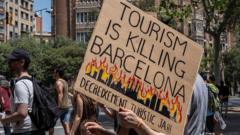In a vibrant display of dissent, protesters took to the streets of Barcelona on Sunday, urging tourists to "Go Home!" as they marched through the city center. With exasperated locals caught in the midst, some were even drenched with water from playful squirt guns, while luxury retailers became the targets of satirical stickers condemning tourist overreliance. The increasing influx of visitors is causing concern as local residents feel the squeeze on their neighborhoods, leading to a growing anti-tourism sentiment across Spain and Southern Europe.
Marina, a protester brandishing a sign that read "Your AirBnB used to be my home", articulated the challenges faced by locals. "The rents are super high due to BnBs and expats seeking the pleasant weather," she lamented. Protesters unanimously emphasized their aim to promote sustainable tourism, not eliminate it, as they rallied towards iconic landmarks like the Sagrada Familia, which attracted over 15 million tourists last year, nearly tenfold the local population, contributing to a strain felt by residents.
Young individuals like Elena, a marine biologist, joined the protest to voice their struggles with rising coffee prices and unaffordable living costs in the city that is rapidly transforming to cater to tourists. However, it’s not just the youth who are affected; elderly locals like Pepi Viu, evicted from her home just this month, struggle to find suitable housing amidst skyrocketing rents.
Joan Alvarez, who has lived in the Gothic quarter for 25 years, expressed his determination to fight remaining in his affordable flat amidst increasing pressure from landlords converting homes to tourist rentals. "This is my home, not just another investment," he insisted while reflecting on the dwindling number of local residents in the area.
In response to mounting protests, the Barcelona government plans an extensive ban on short-term tourist rentals by 2028, risking licenses for 10,000 tourist accommodations. Landlords like Jesus Pereda argue that the focus on historic rental issues overlooks the broader trend of nomadic workers driving up costs. "We’ve been made scapegoats for a complex problem," he claimed, warning that eliminating tourism could trigger an economic crisis in Barcelona, essential to Spain's GDP.
The protests culminated in chants of "You're all guiris!" – a term for tourists – mingled with firecrackers as demonstrators expressed their frustrations in front of police barriers at the Sagrada Familia. Similar displays of dissent echoed across Spain, Portugal, and Italy, as concerns regarding over-tourism continue to mount. The ongoing discourse reveals deep divisions on how best to address the impact of tourism while maintaining the unique culture and livability of these popular destinations as summer approaches.
Marina, a protester brandishing a sign that read "Your AirBnB used to be my home", articulated the challenges faced by locals. "The rents are super high due to BnBs and expats seeking the pleasant weather," she lamented. Protesters unanimously emphasized their aim to promote sustainable tourism, not eliminate it, as they rallied towards iconic landmarks like the Sagrada Familia, which attracted over 15 million tourists last year, nearly tenfold the local population, contributing to a strain felt by residents.
Young individuals like Elena, a marine biologist, joined the protest to voice their struggles with rising coffee prices and unaffordable living costs in the city that is rapidly transforming to cater to tourists. However, it’s not just the youth who are affected; elderly locals like Pepi Viu, evicted from her home just this month, struggle to find suitable housing amidst skyrocketing rents.
Joan Alvarez, who has lived in the Gothic quarter for 25 years, expressed his determination to fight remaining in his affordable flat amidst increasing pressure from landlords converting homes to tourist rentals. "This is my home, not just another investment," he insisted while reflecting on the dwindling number of local residents in the area.
In response to mounting protests, the Barcelona government plans an extensive ban on short-term tourist rentals by 2028, risking licenses for 10,000 tourist accommodations. Landlords like Jesus Pereda argue that the focus on historic rental issues overlooks the broader trend of nomadic workers driving up costs. "We’ve been made scapegoats for a complex problem," he claimed, warning that eliminating tourism could trigger an economic crisis in Barcelona, essential to Spain's GDP.
The protests culminated in chants of "You're all guiris!" – a term for tourists – mingled with firecrackers as demonstrators expressed their frustrations in front of police barriers at the Sagrada Familia. Similar displays of dissent echoed across Spain, Portugal, and Italy, as concerns regarding over-tourism continue to mount. The ongoing discourse reveals deep divisions on how best to address the impact of tourism while maintaining the unique culture and livability of these popular destinations as summer approaches.























